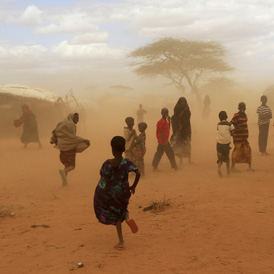Somalia famine: US withholds aid to rebel-held areas
The US gives $28 million in aid but says the money won’t be used in rebel-held famine regions, unless it receives assurances from militants. Channel 4 News talks to the head of the UN in Somalia.
The US agency for international development, USAid, has said America will not release aid into al-Shabaab territory unless the UN makes assurances that the money will not be diverted away from humanitarian efforts.
Two of Somalia‘s hardest-hit regions, now declared to be in a state of famine, are Bakool and Lower Shabelle in the south of the country. Both are believed to be in the hands of al-Shabaab, which some say is affiliated to al-Qaeda. The group is on the US list of terrorist organisations.
“Unfortunately, about 60 per cent of people affected are in al-Shabaab territories. We’ve instructed Unicef and the World Food Programme (WFP) that they can use our assistance in any part not under al-Shabaab control,” Donald Steinberg, the deputy administrator of USAid, said.
“As soon as UN and WFP declare that al-Shabaab is not going to be taxing assistance or hindering assistance using the local population as hostages and can prove unfettered access we are prepared to go ahead with assistance through any agency.”

The decision not to release the money, which the US says follows $431 million dollars (£265 million) in emergency assistance already given this year, comes after al-Shabaab said it would lift a ban on foreign aid agencies working in their territory.
The group has previously attacked and threatened aid agencies, leading to the withdrawal of the UN’s World Food Programme from southern areas in January 2010.
Mark Bowden, the head of the UN’s humanitarian effort in Somalia, told Channel 4 News that the UN is committed to dialogue with al-Shabaab but said there had been no breakthrough in talks.
“The dialogue is continuing at a local level, and we are awaiting to see if there are any developments, but it is too early to say if there are any positive signs,” Mr Bowden said.
But he stressed that the UN is working with other agencies in the region to assist Somalis in Bakool and Lower Shabelle.
He added that nearly half the people in Somalia are in crisis and roughly $300 million (£185 million) in aid is needed in the next two months, urging european nations to give more.
Somalia famine - view from the ground
"Delivering aid in conflict zones is always a dangerous business. Yet the UN must be given the chance to succeed, because the alternative doesn't really bear thinking about: tens of thousands more dead children."
Read more: Channel 4 News Correspondent Jonathan Rugman on the death of a generation in Somalia.
Shortfall in aid
Britain has proved the biggest donor to Somalia so far with £25 millioncommitted for aid projects inside Somalia in the last week, on top of £30 million for this year.
But Oxfam said several rich European countries should do more to provide emergency aid. The aid agency said there is an $800 million (£490 million) shortfall in funds. They say $1 billion is needed to fund relief efforts through January.
Oxfam regional director Fran Equiza released a statement Wednesday saying it was “morally indefensible” that countries have only pledged $200 million (£123 million) in addition to long-running programs.
Tens of thousands dead
The UN says tens of thousands of people have already died in Somalia, and tens of thousands more – mostly children – are at risk in the coming weeks.
Around 3.7 million people – almost half of the Somali population – are now facing severe food shortages, 2.8 million of whom are in the south.
One in 10 children in parts of Somalia could starve to death.
In East Africa as a whole 500,000 children are at risk of death and 10 million people are now in need of emergency assistance as a result of failed harvests, drought, rising food prices and conflict.
To donate to the DEC East Africa Crisis Appeal, click here, or call the 24 hour hotline on 0370 60 60 90.